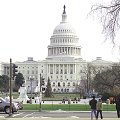- By Renée Gamela
- News
 Print
Print  U.S. Representative Richard Hanna released this statement today on The Middle Class Tax Relief & Job Creation Act of 2011. The bill was approved by a vote of 234-193.
U.S. Representative Richard Hanna released this statement today on The Middle Class Tax Relief & Job Creation Act of 2011. The bill was approved by a vote of 234-193.“This legislation extends the current payroll tax cut for Upstate workers. This provision is critical to middle class families," Hanna says. "Without extending this rate, families could see their taxes raise by $1,000 next year.
Among the highlights of the bill:
Extending the Payroll Tax Reduction: The legislation would extend the current payroll tax rate reduction which lowers the standard Social Security payroll tax rate by two percentage points for employees and the self-employed for one year, expiring on December 31, 2012. The bill would extend the current rate of 4.2 percent for employees, and 10.4 percent for the self-employed. To protect the Social Security trust funds from a loss of payroll tax revenues, the law requires appropriated amounts to be transferred from the general fund to replicate the transfers which would have otherwise occurred to the Trust Fund.
Extending and Reforming Unemployment Insurance: The bill would extend and reform federally funded benefits under the Emergency Unemployment Compensation (EUC) and the Extended Benefit (EB) programs though the end of January 2013. The bill would use a two-step process to gradually reduce the current maximum amount of time total benefits could be distributed in states with high unemployment from 99 weeks to 59 weeks by mid-2012. For individuals who are collecting EUC benefits in December 2011, the bill would allow them to complete the tier of benefits they are currently in.
In addition, the bill would reform the UI program to require that participants are actively working and training towards employment and to streamline the program. Some of these requirements are listed below.
- The bill would establish job search requirements for everyone collecting state UI benefits to ensure that all are actively seeking work and have registered for employment services, and posted resumes.
- The bill would require UI recipients who lack a high school diploma to be making progress toward a GED, but allows a state to waive this requirement if it would be unduly burdensome in individual cases.
- The bill would allow states the option to drug test recipients they have determined are likely to be using illegal substances.
Medicare Physician Payment Rates: This provision would prevent a 27.4 percent cut in Medicare physician payment rates slated to begin on January 1, 2012 and instead rates by 1 percent in 2012 and again in 2013. The two years of stable Medicare payment rates would be the most certainty physicians have had since 2004.
Extension of 100 Percent Expensing: The bill would extend 100 percent expensing for qualified real property purchased by a business for an additional taxable year, through 2012. Extending 100 percent expensing will encourage businesses to invest in additional real property.
Flood Insurance Reform: The provision would reauthorize, reform and strengthen the National Flood Insurance Program (NFIP) to ensure that it is actuarially sound and able to respond to future emergencies without incurring more debt or lapsing. This legislation would reauthorize the program through 2016 and make changes aimed at improving the financial status of the program, including increased premiums for certain higher-risk properties and removing premium subsidies for certain properties. Other key provisions of extension include a one-year delay in the mandatory purchase requirement for certain properties; a phase-in of full-risk, actuarial rates for areas newly designated as Special Flood Hazard; establishment of the Technical Mapping Advisory Council; and an emphasis on greater private sector participation in providing flood insurance coverage.
“This bill also helps those who need it most by extending Unemployment Insurance benefits, while making permanent reforms in the system to focus on personal responsibility. Small businesses will benefit from an extension of 100 percent expensing for real property investments – an element of my AGREE Act jobs bill," Hanna says. "Notably, this bill will not increase the federal deficit, but rather reduces it over the long-term. These programs will be fully paid-for by commonsense steps like freezing pay for Members of Congress and ending fraud, abuse and waste in various Washington programs.”
v7i48



